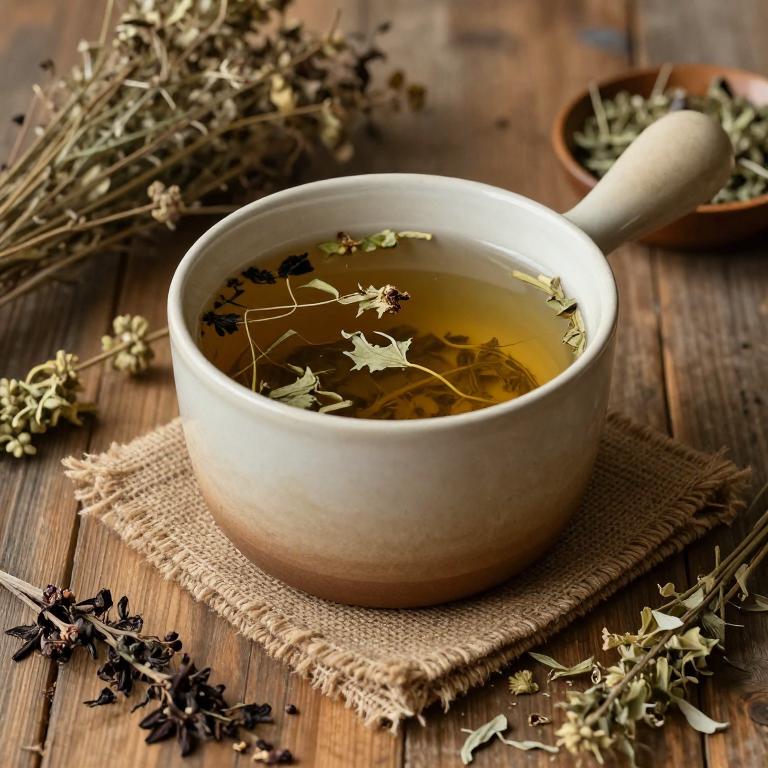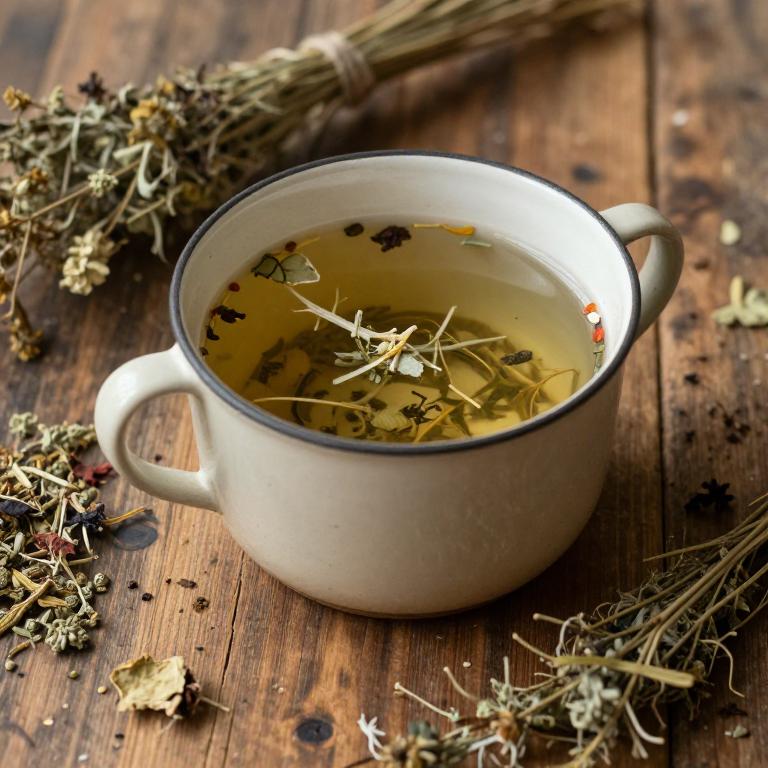10 Best Herbal Decoctions For Neuritis

Herbal decoctions have been traditionally used to support the treatment of neuritis, an inflammation of the nerves that can cause pain, tingling, and numbness.
These decoctions typically combine various herbs known for their anti-inflammatory, analgesic, and neuroprotective properties, such as willow bark, turmeric, ginger, and valerian root. The preparation involves simmering the selected herbs in water to extract their active compounds, which are then consumed as a tea or taken internally to promote nerve healing and reduce inflammation. Some herbal decoctions may also be applied topically to affected areas to provide localized relief.
While herbal treatments can be beneficial, they should be used under the guidance of a qualified healthcare practitioner to ensure safety and effectiveness.
Table of Contents
- 1. St. john's wort (Hypericum perforatum)
- 2. Stinging nettle (Urtica dioica)
- 3. Salvia (Salvia officinalis)
- 4. Chaste tree (Vitex agnus-castus)
- 5. Yarrow (Achillea millefolium)
- 6. Dog rose (Rosa canina)
- 7. Echinacea (Echinacea purpurea)
- 8. Ginkgo (Ginkgo biloba)
- 9. White water lily (Nymphaea alba)
- 10. Turmeric (Curcuma longa)
1. St. john's wort (Hypericum perforatum)

Hypericum perforatum, commonly known as St. John's Wort, has been traditionally used in herbal medicine for its potential anti-inflammatory and neuroprotective properties.
When prepared as a decoction, the plant's active compounds, including hypericin and hyperforin, may help reduce inflammation associated with neuritis by modulating neurotransmitter levels and inhibiting pro-inflammatory pathways. Herbal decoctions of Hypericum perforatum are often recommended for their ability to support nerve health and alleviate symptoms such as pain and tingling. However, it is important to note that St. John's Wort can interact with various medications, so its use should be discussed with a healthcare provider.
Despite its traditional use, further clinical research is needed to fully understand its efficacy and safety in treating neuritis.
2. Stinging nettle (Urtica dioica)

Urtica dioica, commonly known as stinging nettle, has been traditionally used in herbal medicine for its anti-inflammatory and analgesic properties.
Herbal decoctions made from the leaves and stems of Urtica dioica are often prepared by simmering the dried plant material in water for several minutes. These decoctions are believed to help reduce inflammation and pain associated with neuritis by promoting circulation and reducing nerve irritation. Some practitioners recommend consuming the decoction internally or applying it topically to affected areas.
While preliminary research suggests potential benefits, it is important to consult a healthcare professional before using stinging nettle for neuritis, as it may interact with certain medications or conditions.
3. Salvia (Salvia officinalis)

Salvia officinalis, commonly known as common sage, has been traditionally used in herbal medicine for its potential anti-inflammatory and neuroprotective properties.
Herbal decoctions made from salvia officinalis may help alleviate symptoms of neuritis by reducing inflammation and oxidative stress in nerve tissues. The active compounds in sage, such as rosmarinic acid and flavonoids, are believed to support nerve health and repair. While preliminary studies suggest its efficacy, more clinical research is needed to confirm its role in treating neuritis.
Nonetheless, sage decoctions are often used as a complementary therapy in holistic approaches to nerve-related conditions.
4. Chaste tree (Vitex agnus-castus)

Vitex agnus-castus, commonly known as chaste tree, has been traditionally used in herbal medicine for its potential therapeutic effects on hormonal imbalances and inflammatory conditions.
Herbal decoctions made from Vitex agnus-castus may help reduce inflammation associated with neuritis by modulating immune responses and reducing oxidative stress. The active compounds in Vitex, such as flavonoids and lignans, are believed to possess anti-inflammatory and neuroprotective properties. While research on its specific efficacy for neuritis is limited, some studies suggest it may support nerve health and alleviate symptoms in certain inflammatory conditions.
As with any herbal remedy, it is important to consult a healthcare professional before use, especially for individuals with existing medical conditions or those taking other medications.
5. Yarrow (Achillea millefolium)

Achillea millefolium, commonly known as yarrow, has been traditionally used in herbal medicine for its anti-inflammatory and analgesic properties.
Herbal decoctions of Achillea millefolium may help alleviate symptoms of neuritis by reducing inflammation and promoting nerve healing. The active compounds in yarrow, such as flavonoids and essential oils, contribute to its therapeutic effects on nerve tissue. Preparation of a decoction involves simmering dried yarrow leaves in water for several minutes, allowing the beneficial compounds to be extracted.
While some studies suggest potential benefits, it is important to consult a healthcare professional before using yarrow decoctions for neuritis, as it may interact with certain medications or have side effects in specific populations.
6. Dog rose (Rosa canina)

Rosa canina, commonly known as dog rose, has been traditionally used in herbal medicine for its anti-inflammatory and analgesic properties.
Herbal decoctions made from the hips of Rosa canina are believed to support nerve health and may help alleviate symptoms of neuritis, an inflammation of the nerves. The active compounds in Rosa canina, such as flavonoids and vitamin C, contribute to its potential therapeutic effects on nerve function and tissue repair. When preparing a decoction, the dried hips are simmered in water to extract their beneficial constituents, which can then be consumed as a tea or taken in capsule form.
While more research is needed to confirm its efficacy, Rosa canina herbal decoctions are often used as a complementary therapy in the management of neuritis.
7. Echinacea (Echinacea purpurea)

Echinacea purpurea, commonly known as purple coneflower, has been traditionally used in herbal medicine for its potential anti-inflammatory and immune-boosting properties.
Herbal decoctions made from Echinacea purpurea are often prepared by simmering the dried roots, leaves, and flowers in water to extract their active compounds. These decoctions may help reduce inflammation associated with neuritis by modulating immune responses and decreasing oxidative stress. While some studies suggest possible benefits, more research is needed to confirm their efficacy for treating neuritis.
As with any herbal remedy, it is important to consult a healthcare professional before use, especially for individuals with existing medical conditions or those taking other medications.
8. Ginkgo (Ginkgo biloba)

Ginkgo biloba herbal decoctions have been traditionally used to support nerve health and alleviate symptoms of neuritis, a condition characterized by inflammation and damage to nerves.
The active compounds in ginkgo, such as flavonoids and terpene lactones, are believed to improve blood circulation and reduce oxidative stress, which can contribute to nerve damage. These decoctions may help enhance nerve function and promote healing by increasing the delivery of oxygen and nutrients to affected tissues. However, while some studies suggest potential benefits, more rigorous clinical research is needed to fully establish their efficacy and safety for treating neuritis.
As with any herbal remedy, it is important to consult a healthcare professional before use, especially for individuals with existing medical conditions or those taking other medications.
9. White water lily (Nymphaea alba)

Nymphaea alba, commonly known as the white water lily, has been traditionally used in herbal medicine for its anti-inflammatory and neuroprotective properties.
Herbal decoctions made from its rhizomes and leaves are believed to support nerve health and alleviate symptoms of neuritis by reducing inflammation and promoting tissue repair. The active compounds in Nymphaea alba, such as alkaloids and flavonoids, may help modulate nerve function and reduce oxidative stress. While preliminary studies suggest potential benefits, more clinical research is needed to confirm its efficacy for neuritis.
As with any herbal treatment, it is important to consult a healthcare professional before use, especially for individuals with pre-existing medical conditions or those on medication.
10. Turmeric (Curcuma longa)

Curcuma longa, commonly known as turmeric, has been traditionally used in herbal medicine for its anti-inflammatory and antioxidant properties.
Herbal decoctions made from Curcuma longa are often prepared by boiling the rhizomes in water to extract bioactive compounds such as curcumin. These decoctions may help alleviate symptoms of neuritis by reducing inflammation and oxidative stress in nerve tissues. Studies suggest that curcumin can modulate inflammatory pathways and support nerve repair, making it a potential complementary therapy for neuritis.
However, further clinical research is needed to establish its efficacy and optimal dosage for treating this condition.